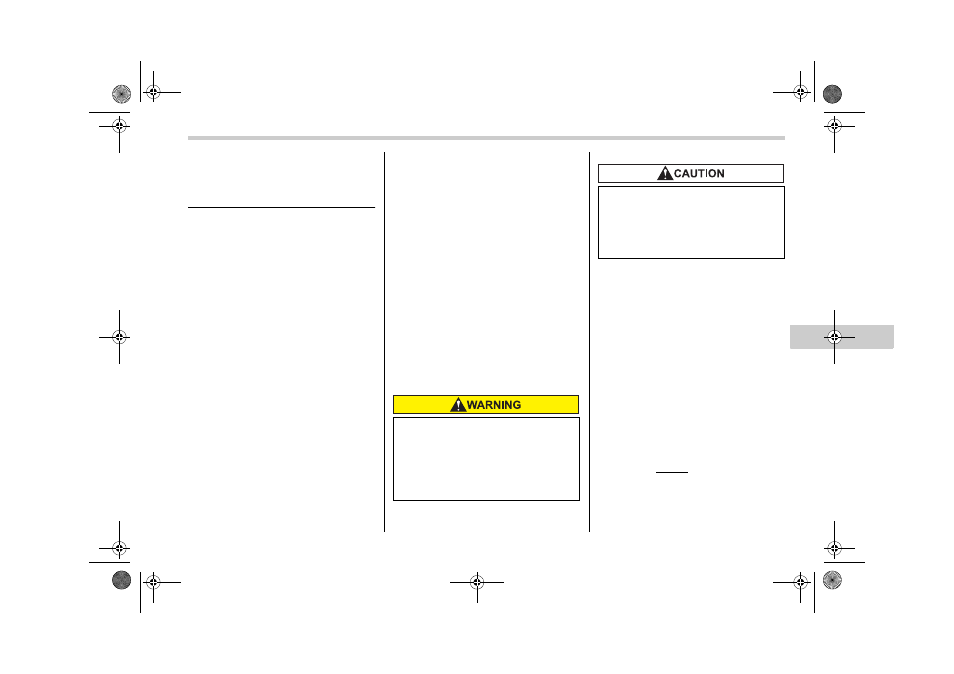Saab 2006 9-2 User Manual
Page 177

Starting and operating
7-5
7
– CONTINUED –
State emission testing (U.S.
only)/Canadian Provincial
Emission Testing
At state inspection time, remember to
tell your inspection or service station
in advance not to place your Saab AWD
vehicle on a two-wheel dynamometer.
Otherwise, serious transmission dam-
age will result.
Some states/provinces have started using
dynamometers in their state inspection
programs in order to meet their obligation
under federal law to implement stricter ve-
hicle emission standards to reduce air pol-
lution from vehicles. A dynamometer is a
treadmill or roller-like testing device that
allows your vehicle’s wheels to turn while
the vehicle remains in one place. Depend-
ing on the severity of a state’s air pollution
problems, the states must adopt either a
“basic” or “enhanced” vehicle emission in-
spection test. Normally, a portion of the
basic emission test consists of an emis-
sion inspector inserting an analyzer probe
into the exhaust pipe of an idling vehicle
for a short period of time. States with more
severe air pollution problems are required
to adopt an enhanced vehicle emission
test. This test simulates actual driving
conditions on a dynamometer and permits
more accurate measurement of tailpipe
emitted pollution than the basic emission
test.
The U.S. Environmental Protection Agen-
cy (EPA) and states using two-wheel dy-
namometers in their emission testing pro-
grams have EXEMPTED Saab AWD vehi-
cles from the portion of the testing pro-
gram that involves a two-wheel dynamom-
eter.
There are some states that use four-wheel
dynamometers in their testing programs.
When properly used, that equipment will
not damage an AWD Saab vehicle.
Under no circumstances should the rear
wheels be jacked off the ground, nor
should the driveshaft be disconnected for
state emission testing.
The EPA has issued regulations for in-
specting the On-Board Diagnostic (OBD)
system as part of the state emissions in-
spection. The OBD system is designed to
detect engine and transmission problems
that might cause vehicle emissions to ex-
ceed allowable limits. These inspections
apply to all 1996 model year and newer
passenger cars and light trucks. Over 30
states plus the District of Columbia have
implemented the OBD system inspection.
The inspection of the OBD system con-
sists of a visual operational check of the
“CHECK ENGINE” warning light/malfunc-
tion indicator lamp (MIL) and an examina-
tion of the OBD system with an electronic
scan tool while the engine is running.
A vehicle passes the OBD system in-
spection if proper the “CHECK ENGINE”
warning light/MIL illumination is observed,
there is no stored diagnostic trouble
codes, and the OBD system readiness
monitors are complete.
Testing of an All-Wheel Drive vehi-
cle must NEVER be performed on a
single two-wheel dynamometer. At-
tempting to do so will result in un-
controlled vehicle movement and
may cause an accident or injuries to
persons nearby.
Resultant vehicle damage due to im-
proper testing is not covered under
the Saab Limited Warranty and is
the responsibility of the state in-
spection program or its contractors
or licensees.
A1910BE-A-GSAAB.book Page 5 Tuesday, September 6, 2005 8:37 AM